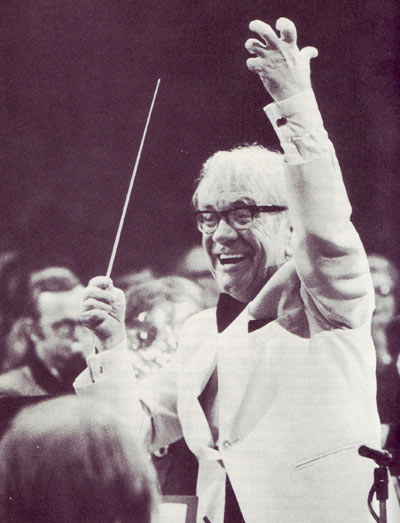
Genius at work...
It can be safely assumed that only people with a self-possessed sense of fame ponder long and hard on how they would like to be remembered after their death.
Others rely on their talent making a lasting mark on posterity.
And one man whose fame will certainly endure over time is Walter Hargreaves - the inimitable ‘Wee Professor’, who 50 years ago memorably led Brighouse & Rastrick to the 1968 National title (repeating the feat a year later).
And whilst Scotland can lay claim to its fair share of great players and conductors, few have come close to making such a mark on banding history as Walter Barrow Hargreaves, born on the 27th April 1907 in Glasgow.
Musical sound
He was taught by his father from the age of 7, and within a few years joined his North British Locomotive Works Band in Glasgow. Walter and his brother Tommy were given music lessons, even though money was tight.
Tommy became a miner, but as Walter later recalled, he managed to secure musical work by playing for silent movies, where he later joined him in the musical pits of Glasgow theatres and cinemas.
“My brother played with Willie Crozier at CWS and I used to help out from time to time. The sound was magnificent.”
“The work gave me a wealth of experience, but I had no concept of the ‘sound’ of brass until I crossed paths with the Scottish CWS – known as the ‘Band with the Organ Tone’,” he later said.
“My brother played with Willie Crozier at CWS and I used to help out from time to time. The sound was magnificent.”
After a period with the Highland Light Infantry Band, Walter went on to study with composer, William Beaton Moonie at the Royal Scottish Academy of Music. A career with the trumpet followed at the Pavilion Theatre, Glasgow, during the war years at the Edinburgh Empire and with the Reid Symphony Orchestra playing at Edinburgh’s Usher Hall.
First post
In 1946 he was also playing trumpet with the National Symphony Orchestra and had enjoyed a few chances to play with other London orchestras when they visited Scotland. “These introduced me to many of the ‘big name’ brass players of the day,” he said.
It was this work that helped secure the appointment at the Reid Orchestra where part of his duties was the recruitment of additional brass players when required.
“I engaged a cornet player, Archie Lees, who played with the City of Edinburgh Band and it was he who pressed me to conduct the band - my first post,” he later recalled.
In 1945 he took them to the Third Section Area Championship, followed by the National Final, and then the Area contest of 1946.
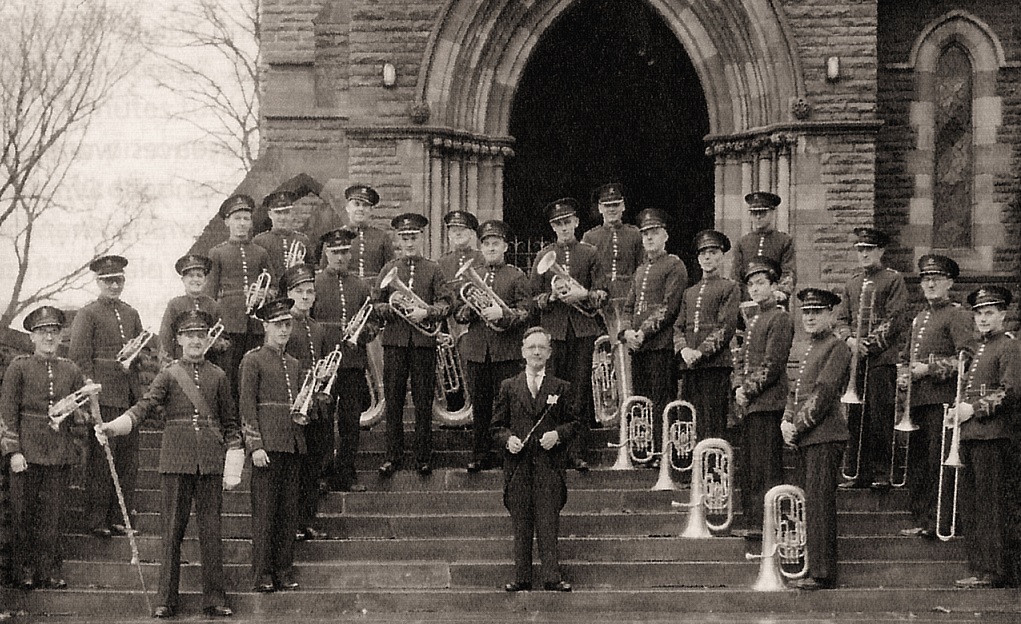
Leading Cory from the front in 1950
However, the records also show that he conducted Cory Workmen’s Band at the Belle Vue Open in September 1946 – a change of fortune that was engineered by Harry Mortimer.
He had initially auditioned the City of Edinburgh Band for broadcast purposes, but as he recalled in his book, ‘Harry Mortimer On Brass’: “The Band itself were not of a very high standard, but it was clear they had an outstanding conductor – a small man of flair, who also played the cornet very well, but was a stranger to me.
Under the spotlight at Cory
Appreciating his talent, I enquired what he was doing conducting a band of this calibre, to which he replied in a broad Scottish accent; ‘Can you find me a better job?’ I was able to tell him that I could, and forthwith recommended him to the Cory Band.”
Years later Walter recalled the rather peculiar Cory bandroom audition of the summer 1946 in an old lamp room of the disused Pentre Colliery.
“It was split up into three different sections: Rehearsal from 11.30am to 1.00pm, then two more stints of one hour each, with about a half hour in between.”
“The band was seated at the far end, but from the entrance up to within two yards of where the band was sitting, benches were placed, and also along each wall. There must have been around 150 people packed into the hall as every seat was occupied.”
Hargreaves was under the spotlight, and during the first stint a number of local conductors and players sat around watching him work.
“The band was seated at the far end, but from the entrance up to within two yards of where the band was sitting, benches were placed, and also along each wall. There must have been around 150 people packed into the hall as every seat was occupied.”
It was a mini concert audition, but Walter passed it and later said: “We were together for six happy and profitable years, up until my appointment as a professor with the Royal Marines School of Music.”
That wasn’t an easy decision. He had married his most dedicated fan, Kate, and when offered the Cory job he found himself at a career crossroads.
He turned to her for advice, as at the same time he had received a telegram from Sir Malcolm Sargent offering him the post of Principal Trumpet with the Royal Liverpool Philharmonic Orchestra.
Her advice was simple: “Please yourself! Whatever you do is right as far as I’m concerned.”
Greatest thrill and biggest disappointment
And so, the Hargreaves family moved to Pentre in the Rhondda Valley.
“The Cory Band was really my baby”, he told Harold Nash in an interview for 'Sounding Brass' in 1976.
“They were a good band but not a great one, and it set a tremendous challenge for me. These men, most of whom were miners, had music inside them and all that was needed was to channel their thoughts in the right direction.”
His greatest thrill came with second prize at the National Final in 1948, although his “biggest disappointment” was the second place at the 1950 Open on Eric Ball’s ‘Resurgam’.
We were indeed ‘transported’ into another world. No one in the audience had the slightest doubt (or so it seemed) that Cory had won the coveted title, but it was not to be.”
“How long it was before the final note ended in a long drawn out diminuendo and the tremendous burst of applause which followed I do not suppose I will ever know,” he later said.
“I just remember allowing my hands to gradually drop down, and it seemed an eternity before that wonderful reception dawned on me and every member of the band.
We were indeed ‘transported’ into another world. No one in the audience had the slightest doubt (or so it seemed) that Cory had won the coveted title, but it was not to be.”
Cory lost out to Fairey Aviation led by Harry Mortimer.
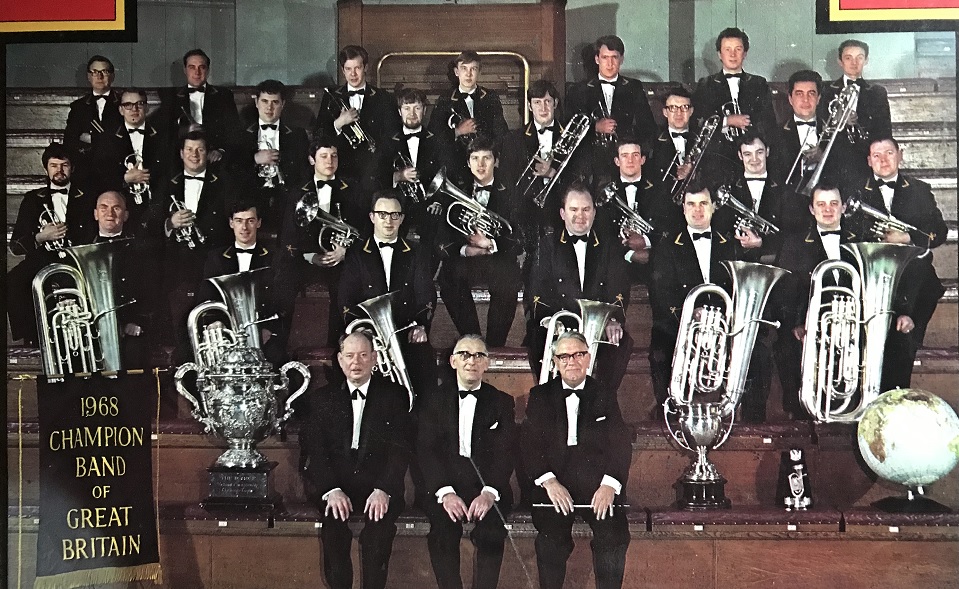
World Champion with Brighouse & Rastrick in 1968
Banding life became increasingly busy but insecure - including weekends in Wales taking rehearsals with several bands - and influenced by Kate, he accepted an offer from Sir Vivian Dunn to become Cornet Professor at the Royal Marines in the seaside town of Deal in Kent.
Hargreaves soon found himself working with local bands, principally Betteshanger Colliery, but it was his tenure during this period at three others that eclipsed all that went before, and for which he justifiably claims a place in any banding Hall of Fame: Brighouse & Rastrick, Stanshawe (Bristol) and Fairey Engineering Works.
A World Champion in the making
By the early 1960s Brighouse was a worried band. They had won nothing of note since 1946. Self funded, money was an issue and they were struggling to compete with the top sponsored works and colliery bands of which there were many.
They decided to approach Walter to conduct them alongside the hard working Jim Hickman as his band master. He stayed 10 years from 1963 – 1973, but his impact was immediate; gaining second prize at London in 1963 and third in 1967, with fourth at Belle Vue in 1964 and second in 1965.
“The consecutive World Championship wins in 1968 and 1969 were what gave me the biggest thrill, especially the second time,” he told Harold Nash. “The first one I expected to win, the second one I hoped to.”
However, despite the rather nonsensical PR stunt of being called a World Championship, it was all topped by the National title victory of 1968. The following year, dispensing with the score of Eric Ball’s ‘High Peak’ as he took to the stage, they won it again.
“The consecutive World Championship wins in 1968 and 1969 were what gave me the biggest thrill, especially the second time,” he told Harold Nash. “The first one I expected to win, the second one I hoped to.”
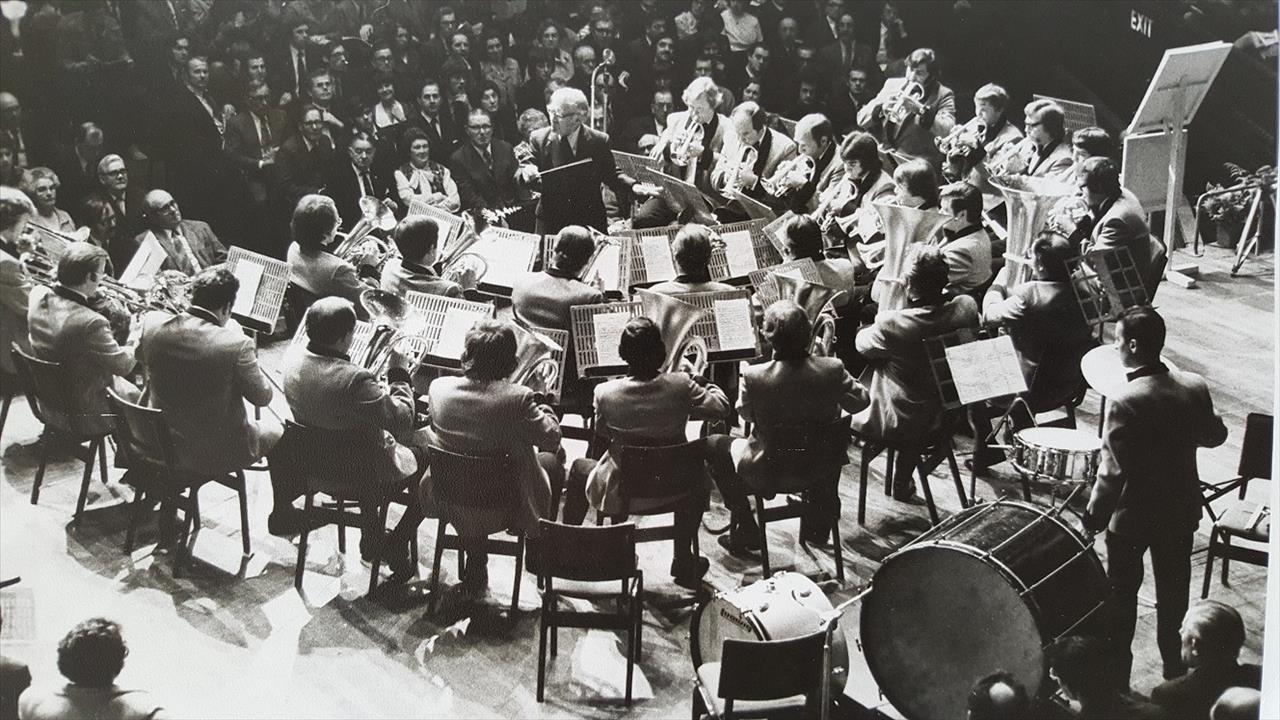
Bringing Stanshawe to the fore at the Royal Albert Hall
In 1968 he also found himself travelling regularly to the West Country when a group of somewhat disgruntled players formed the Stanshawe Band.
Their aspirations soon began to take shape as founder member Dave Alderman recalled: “It all started to take off when Lyndon Baglin, Dave Thomas and Derek Horsfall arrived with their vast experience of ‘top banding.’
Thinking first class with Stanshawe
Then, with a crucial guiding hand from Lyndon, Walter Hargreaves was persuaded to become musical director. He gave us so much self belief with phrases like ‘think first class’, ‘I’ve got more belief in you than you’ve got in you’ and ‘the music is not in the black bits, it’s in the white bits in between’.
What a band trainer he was, he could slap you down one minute and make you feel like a king the next.”
Soon he led Stanshawe to the Second Section regional title in 1971. When someone pointed out they didn’t have a full band he dryly replied: “There were fewer people to play wrong notes”.
Years later Hargreaves talked about those times at Stanshawe. “In those early 70s it was a most promising Second Section band. All the players around the stand could play all the notes but I had to help them improve the sound. I embarked on a building job which took the band through to many National successes.”
Soon he led Stanshawe to the Second Section regional title in 1971. When someone pointed out they didn’t have a full band he dryly replied: “There were fewer people to play wrong notes”.
They then went on to gain second place at the National Final and promotion to Championship Section status. In 1972, now called Stanshawe (Bristol), they won the Grand Shield at Belle Vue, competed at the subsequent British Open and were placed third at the Granada Band of the Year.
Indelible mark
A more indelible mark came the following year in winning the top section of the West of England Area and coming sixth at Belle Vue. Soon the honours flowed: Retaining the West of England crown in 1974 they went on to win the Granada Band of the Year title and were runner-up at the British Open.
It was a momentous result as Ralph Rowden, a former cornet player recalled: “We came second to Black Dyke. Incredible!”
However, Black Dyke in fact became their bogey band, coming runner-up to them at the National in 1975 and the Open in 1976.
That said, they also secured third prizes at the Granada Band of the Year in 1975, 1977 and 1978, and won the BBC ‘Best of Brass’ and Lansing Bagnall competitions in 1979 - exceptional achievements for a band less than a decade old.
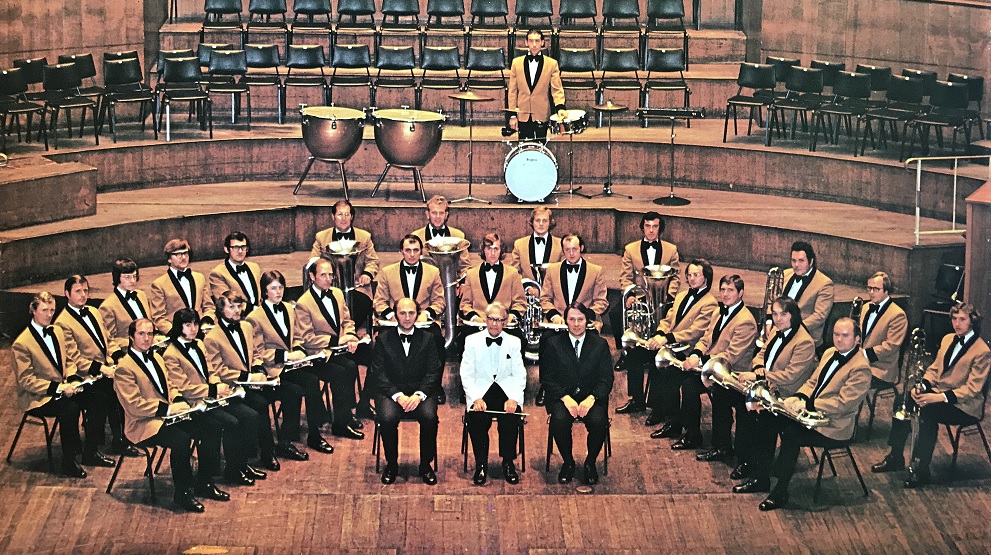
A rival to Black Dyke in the mid 1970s
Last major move
One major move remained though, and when Richard Evans left Fairey it was Walter Hargreaves who replaced him.
Former cornet player Alan Lawton recalled the occasion: “He took us to the Area (1978) on ‘Belmont Variations’ within three weeks after arriving and we won it for the first time in 15 years. Of course, with success like that he immediately had the respect of the players.”
Alan also vividly remembers the first Sunday morning rehearsal before a concert where he only had time to ‘top and tail’ the programme.
He said: ‘Rubbish! Absolute rubbish! But give me three years and there won’t be a band in the country to touch you’. And that wasn’t boasting because in the next three years we won every major contest with the exception of the National.”
“I remember going across to him at the end of the concert saying, ‘Well Professor, what do you think of the band?’
He said: ‘Rubbish! Absolute rubbish! But give me three years and there won’t be a band in the country to touch you’. And that wasn’t boasting because in the next three years we won every major contest with the exception of the National.”
Genius
Those times were recently recalled by Fairey stalwart Brian Taylor, who spoke to 4BR about Hargreaves and the band’s famous 1979 British Open win on ‘Carnival Romain’ - one on which he was principal cornet.
“Hargreaves was a genius, a wonderful character, so different to a lot of people. He had a lot of faith in me as a young man, but he could make you or destroy you. He would take you to one side and give you a grilling and then build you into his mould.
He was a very prickly character. Very eccentric but he could make wonderful music.”
That was the last great peak of achievement for Walter Hargreaves.
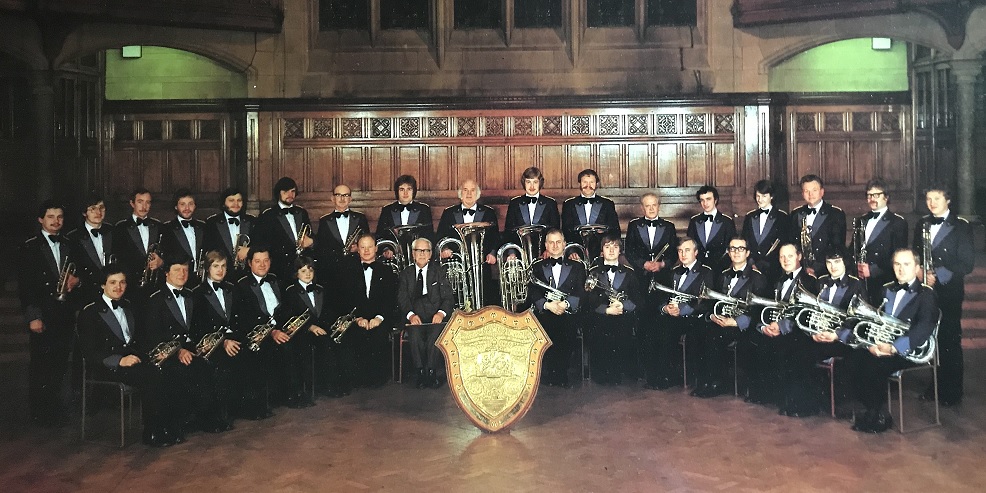
British Open Champion in 1979
Leaving Fairey’s in 1981, he went on to work with the likes of Carlton Main Frickley Colliery, Ever Ready, Hanwell and Kirkintilloch, gaining successes and keeping his reputation intact despite his advancing years before finally retiring around 1987.
Personally, I would rate his most successful time as that with Stanshawe, although he told Alan Lawton that the happiest period was with Fairey. All though he said, were surpassed by his marriage to Kate.
Peer review
As for his peers?
Bram Gay wrote this for the website of the Sun Life Band, which neatly captures the essence the ‘Wee Professor’.
“Walter was never fully valued, despite his many successes. It was his sense of fun, perhaps, which misled people into the belief that he was not a serious musician and a skilled conductor. He was both.
His background, gained in the symphony orchestra, was huge, and his technical skills, allied to a finely-tuned musical instinct and splendid ears made him the finest band-teacher of his day.
More, he was a creative conductor with a nearly infallible instinct for the right thing in music; the right turn of phrase, the right balance, and above all perfect intonation.”
His background, gained in the symphony orchestra, was huge, and his technical skills, allied to a finely-tuned musical instinct and splendid ears made him the finest band-teacher of his day. More, he was a creative conductor with a nearly infallible instinct for the right thing in music; the right turn of phrase, the right balance, and above all perfect intonation.”
He added: “Technically WB was complete. He'd been a player and he knew the answers. Asked how we were to secure good intonation he gave us, typically, only one word: buckets.
From that one word we knew the truth, if indeed some of us had ever been unaware of it; that without a mouthpiece of the right size and shape there is no hope for in-tune brass playing.
I sometimes think that it was Walter's near-obsession with intonation that produced that sound of his. The in-tune band, well balanced and playing precisely together, is not a common occurrence.
Wait and see
He concluded: “He bubbled all the time. It was quite impossible to keep him in order. I remember the day at the Granada Festival when I reminded him, as I did all competing conductors, that there was to be no applause before the band began to play.
‘Laddie’, he said cheerfully, ‘wait and see!’.
That was the day the Sun Life Band began its programme without a conductor, on a seven-pace drum roll; and with it in marched Walter, beaming widely. Applaud? The old Kings Hall nearly fell down.”
Walter Hargreaves spent his final days in a care home in Deal. He died in the town’s Victoria Hospital on 29th June 1998 at the age of 91.
Tim Mutum













